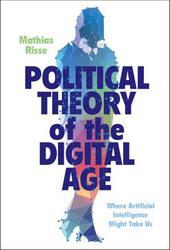
|
Political Theory of the Digital Age: Where Artificial Intelligence Might Take Us
Hardback
Main Details
Description
With the rise of far-reaching technological innovation, from artificial intelligence to Big Data, human life is increasingly unfolding in digital lifeworlds. While such developments have made unprecedented changes to the ways we live, our political practices have failed to evolve at pace with these profound changes. In this path-breaking work, Mathias Risse establishes a foundation for the philosophy of technology, allowing us to investigate how the digital century might alter our most basic political practices and ideas. Risse engages major concepts in political philosophy and extends them to account for problems that arise in digital lifeworlds including AI and democracy, synthetic media and surveillance capitalism and how AI might alter our thinking about the meaning of life. Proactive and profound, Political Theory of the Digital Age offers a systemic way of evaluating the effect of AI, allowing us to anticipate and understand how technological developments impact our political lives - before it's too late.
Author Biography
Mathias Risse is the Berthold Beitz Professor in Human Rights, Global Affairs, and Philosophy at Harvard University. He is the author of On Global Justice (2012), On Justice (2020), and Global Political Philosophy (2020), as well as the co-author of On Trade Justice (2019) and Holding Together: The Hijacking of Rights in America and How to Reclaim Them For Everyone (2022).
Reviews'Human beings are unprepared for the consequences of artificial intelligence and big data analysis - consequences for human rights, democratic government, public spheres, distributive justice, individual dignity, pursuit of meaningful human lives, and the moral status of potentially self-guided artificial intelligence itself. Drawing on a range of political theories and welcome common sense, Mathias Risse briskly frames the agenda to prepare for a world of 'deepfakes,' surveillance capitalism, and machines that alter human lives while operating without human supervision. Especially helpful in challenging assumptions such as that those who gather our data also own it, this book points the way toward preserving both individual and social lives of meaning and deliberate choices.' Martha Minow, Harvard Law School 'In this outstanding book, Harvard's Mathias Risse explores hitherto uncharted terrain of political theory. The liberal-egalitarian tradition, with Rawls as its central figure, has by and large ignored the political nature of technology, thus condemning itself to irrelevance with regard to one of the most pressing political questions of our time: How will digital technology affect human life in the decades to come? [Without appropriate political steps, it is imaginable that humanity will not survive the further development of artificial intelligence. So we, ordinary citizens of the world, had better pay close attention.] Starting from the Rawlsian idea of public reason, Risse's explorative study draws on intellectual traditions ranging from Marxism to science and technology studies in order to toughen up liberal-egalitarian philosophy for the challenge. I hope this well-written book will find a broad readership and inspire much- needed work on this topic of topics.' Michael Schefczyk, Karlsruhe Institute of Technology 'Risse could not be more right that we need to do political theory for a digital age, to come to grips with the political dimensions of our social lives as the very notion of social life is transformed by advances in AI in both the near and far terms. Weaving together insights from the philosophy of technology, rights theory, science and technology studies, and traditional political theory and political philosophy, Risse reveals both the depth of challenges we face across a spectrum of issues in the immediate and distant future, and the promise of a reconfigured political theory for resolving them. The breadth and care that Risse takes with both the technological possibilities and the philosophical and political foundations is remarkable. This is a must-read!' John Basl, Northeastern University
|